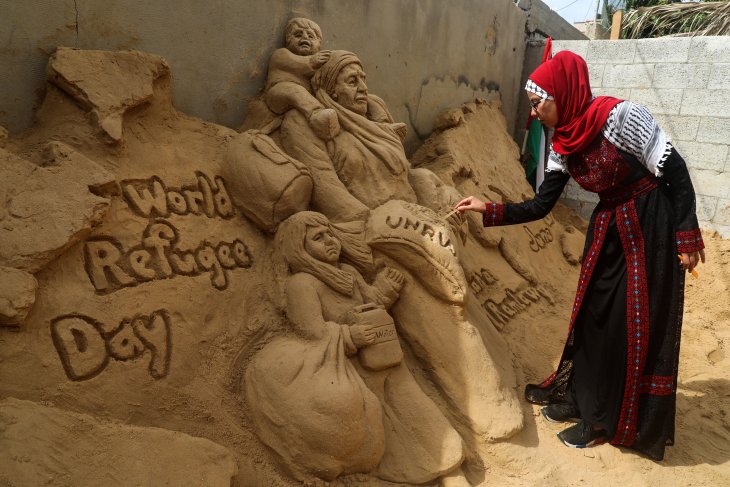From late January 2025, the Israeli ban on the United Nations Relief and Works Agency for Palestine Refugees (UNRWA) will come into effect. What does this mean for the rights of the Palestinian refugees, and who will then take responsibility for helping them?

A Palestinian sand sculptor commemorating World Refugee Day in Gaza City in June 2020. Photo: Majdi Fathi/NurPhoto via Getty Images
In October 2024, the Israeli parliament (Knesset) passed two laws targeting UNRWA. Both laws are due to take effect after 90 days.
Much of the focus on how these Israeli laws will impact the Palestinians is naturally on the humanitarian situation in Gaza, which is critically dire. Currently, 91% of Gaza’s population falls into Category 3 food insecurity, while 345,000 individuals are in Category 5. Category 3 is defined as a “crisis,” while Category 5 signifies a “catastrophe.” UNRWA is responsible for importing most of the limited food aid that reaches Gaza, and other humanitarian actors rely on the organization to import and distribute their aid. UNRWA is often described as the cornerstone of humanitarian operations in Gaza. Its collapse would drastically worsen the humanitarian situation unless an alternative suddenly materializes, which is an unlikely scenario. And time is running out.
The collapse of UNRWA also carries significant implications for refugee rights, which have received insufficient attention.
An own goal by Israel?
When UNRWA was established in 1949, the UN High Commissioner for Refugees (UNHCR) did not yet exist. The 750,000 Palestinian refugees at the time fell under a dual structure:
UNRWA was intended to address their immediate needs, including education and primary healthcare, while the UN’s Palestine Conciliation Commission (PCC or UNCCP) was tasked with resolving the political aspects of their refugee status.
UNRWA was not made to address the “permanent solutions” for the refugees, such as the right of repatriation. Such matters were meant to be handled through diplomacy. These political solutions never materialized, however, while UNRWA continued its work. When the UNHCR was created in 1950, the Palestinian refugees were excluded from its mandate.
Two key UNHCR documents explicitly exclude Palestinian refugees due to the existence of UNRWA:
- The 1950 UNHCR Statute, Section 7C: Refugees receiving protection or assistance from other UN organs or agencies are outside UNHCR’s remit.
- The 1951 Refugee Convention, Article 1D: If such protection or assistance ceases, those refugees are automatically entitled to the benefits of the Convention.
If UNRWA were to cease functioning, these clauses would become void, and Palestinians would fall under UNHCR’s mandate.
In theory, this will happen automatically.
Since this is meant to be a legal formality, the former UNRWA spokesperson Chris Gunness has described Israel’s new legislation as an own goal. According to this legal interpretation, the 2.5 million Palestinian refugees in Gaza and the West Bank would immediately come under UNHCR’s jurisdiction once the ban is implemented, thus gaining strengthened rights.
The logic here is that unlike UNRWA, UNHCR has the mandate to secure permanent solutions for the refugees, including repatriation (return to their original homes). This aspect — the pressure to secure the Palestinian refugees’ right of return — is what Israel resents the most. It is a pressure Israel has avoided with UNRWA.
Refugee registration
One of UNRWA’s primary tasks is registering all Palestinian refugees. In the absence of a Palestinian state, and due to the great proportion of the Palestinians that are refugees, this is akin to a Palestinian population registry.
To safeguard these records during the current Gaza conflict, they were transferred to Jordan from Gaza and the West Bank and digitized.
It should be technically possible for the UNHCR to “inherit” these records. Critics of UNRWA argue that the Palestinian refugee problem is being inflated by registering refugees generationally, meaning that refugee status passes to descendants of the original refugees. While it is correct that UNRWA registers generationally that is also the practice of the UNHCR, which has even broader criteria for refugee status than UNRWA. This could result in an even faster increase in the number of registered Palestinian refugees if responsibility was transferred to UNHCR. To understand the difference between them, UNRWA registers only patrilineally (children of refugee fathers) and only within specific areas (Gaza, the West Bank, Lebanon, Syria, and Jordan). UNHCR, in theory, could register as refugees also the descendants of refugee mothers and people outside these geographic areas.
A theory not tested
This entire scenario remains theoretical, with major unresolved questions:
- Would UNHCR take on this burden?
- If UNRWA collapses in the occupied Palestinian territories, would its entire mandate cease and all Palestinian refugees end up under UNHCR? Or would UNRWA continue its work in other regions like Lebanon, Jordan, and Syria?
- Could refugees in Gaza and the West Bank fall between UNRWA and UNHCR’s mandates, left unsupported by either?
Beyond legal complexities, there are practical concerns of capacity. Unlike UNRWA, the UNHCR does not usually provide education or healthcare for the refugees. Additionally, UNHCR is already overwhelmed, struggling economically and capacity-wise to protect the rights of a fast-growing refugee population.
Palestinians represent one of the world’s largest refugee populations, and integrating them into UNHCR could flood the system, potentially weakening the rights of both Palestinians and other refugees.
For the Palestinians, such a legal and humanitarian experiment is far too risky.
- Jørgen Jensehaugen is a Senior Researcher at PRIO
- This text was published in Norwegian by Panorama Nyheter 5 December 2024